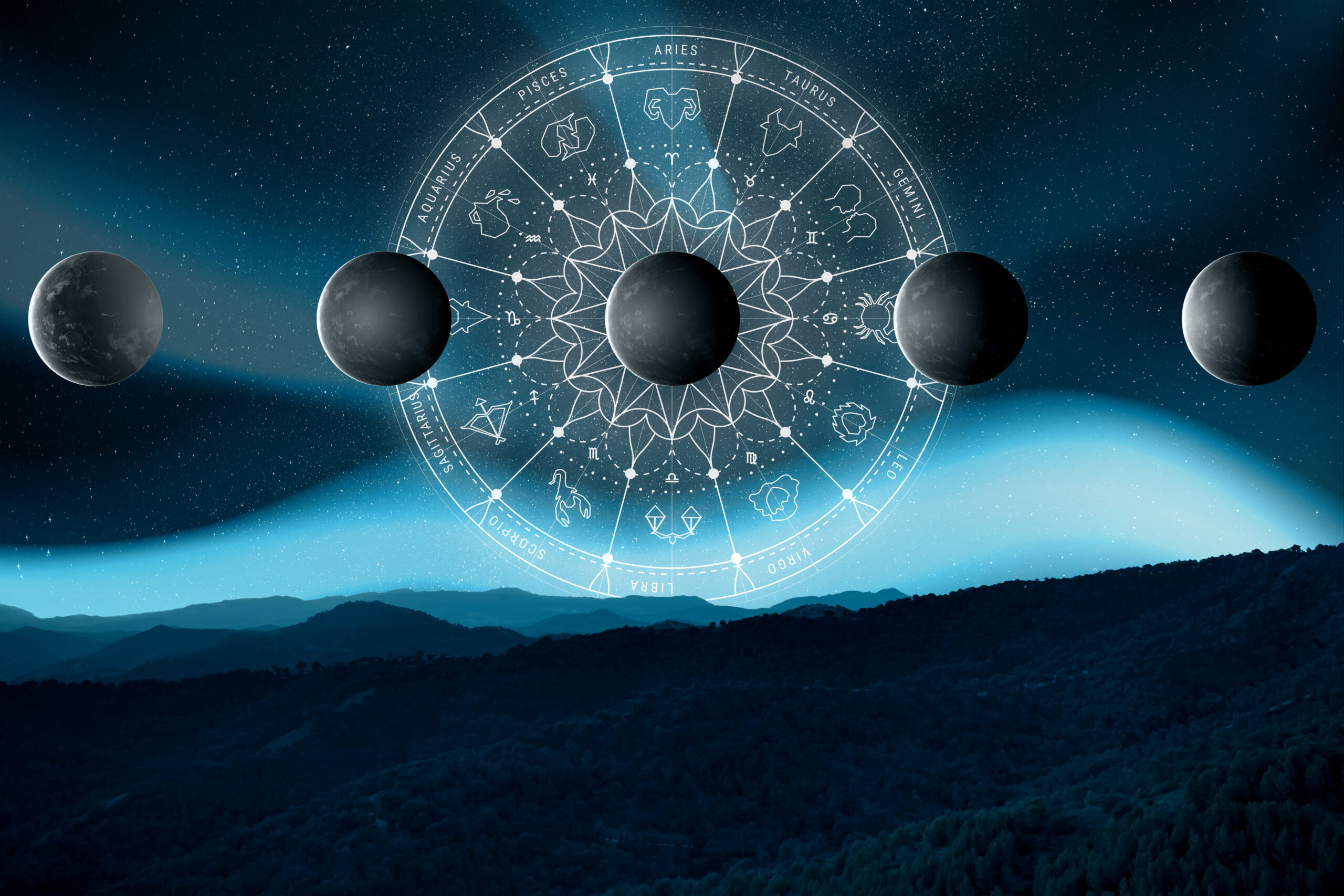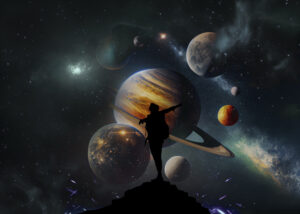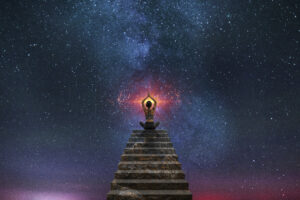Is astrology heresy? In this post, let’s have a look at how Western astrology started, evolved, and was perceived through the ages. We’ll see its origin, development, and controversies from a Christian Orthodox standpoint.
Defining Astrology
One of the most ancient ideas of mankind is the belief in an intimate relationship between heavenly bodies and affairs of life.
Astrology is thus an attempt to use this “relationship” to predict the future but also to uncover hidden aspects of the present.
Throughout the centuries, orthodox leaders have recurrently condemned, as well as embraced, astrology.
Where Astrology began
Mesopotamia, the current region of Iraq, is where astrology had its beginnings. The Babylonians noted that the planets, the sun, and the moon, traveled along the same path in the sky. They then divided this path into twelve segments, the signs of the zodiac.
Originally, the Babylonians were most interested in the links between planetary positions and major events in the life of a ruler or the history of a region.
How Astrology became popular
Later, astrology spread eastward to India and westward around the Mediterranean Sea. Then, the idea of studying the configuration of the planets at the moment of ordinary people’s birth became popular. The new ambition was to learn about people’s characteristics and their fate.
Astrology was further developed in Egypt and Greece. It fitted well with Organicism – the widespread idea developed by Plato that the universe was a gigantic organism (a living being), within which everything was harmoniously linked.
By the time of the Roman Empire, astrology became so popular to the point of causing a decline in the great oracles of the ancient world, such as the Oracle of Delphi.
However, not everyone in the Roman Empire embraced astrology. Some of the great Roman writers, such as Pliny the Elder in his major work Natural History, rejected the claims that astrologers knew enough about the planets and stars to predict the future.
The Condemnation of Astrology by Orthodox Christianity
It took over three centuries for Orthodox Christianity to establish an official position on astrology as heresy. Many early Christians viewed it as a pagan practice, unsuitable for the followers of Christ. It is at the Council of Laodicea that the church formally condemned astrology, in A.D 364 or 367.
In the fifth century, influential theologian Augustine of Hippo completely rejected astrologers. He called “imposters” in his later years, although astrology was one of his interests as a young man. He argues that if the stars could influence human lives, their influence must either depend on God’s will or not. Augustine therefore rejected the idea that the stars could act independently of God, seeing this as a type of atheism. He also rejected the divine dependence of stellar effects (the idea that stars depend on God for events) because astrologers believe stars can cause evil events -but God does not will the evil happenings. Therefore, he concluded, that belief in astrology is heretical, i.e. false and contrary to Christianity.
The Revival of Astrology during the Islamic Golden Age
In the Early Middle Ages, astrology seemed to disappear due to severe orthodox disapproval. It became nearly impossible to find texts from which to learn the art in Europe.
However, much of the ancient astrological knowledge was reignited by the Muslims.
During the Golden Age of Islam (8th -13th century), Muslim scholars received the task of translating the world’s classical knowledge into Arabic and Persian language. Many major scientific works from Greece, including from Ptolemy (renowned Greek mathematician, astronomer, and astrologer), were translated. These translations opened the way to advance current astrological thinkers, giving them access to previously forgotten knowledge of the cosmos.
Contacts with the Muslims increased during the twelfth century in Europe, and thus Europeans rediscovered an interest in the teachings of old Greece and Rome. Some works translated into Arabic were later in turn translated into other languages, such as Hebrew and Latin.
By then, the Catholic Church didn’t show much concern about astrology as it did in the past; its main threat and the focus of its battle was now Christian heresy.
The controversy of Astrology among Christian philosophers
Through the later medieval period, astrology became a topic of controversy once more, generating debates among Orthodox theologians.
Acceptance
Around 1260, Albert the Great (Albertus Magnus), a theologian, bishop, and student of Aristotle’s writings, wrote Speculum Astronomiae (The Mirror of Astronomy) in response to the debate concerning medieval astrology. Albert believed in the power of the stars and defended celestial divination as a Christian form of knowledge. He maintained that celestial bodies transmitted God’s divine power and that understanding these influences allows people to understand the divine plan of creation.
For a scholar study on this:
Albert the Great, the Speculum Astronomiae, and Astrology by Scott Hendrix
Moreover, a great number of the best-known Catholic philosophers and Renaissance intellectuals, such as Thomas Aquinas and Peter Abelard, didn’t see any issue between the influence of the heavenly bodies and Christianity. From their point of view, there was no conflict as long as God and human free will were not said to be under the control of the stars. Abelard even named his son Astrolabe — a Persian astronomical instrument for measuring the position of the stars!
Rejection as heresy
But this wasn’t the view of all church officials. They feared that believing in the power of celestial bodies competed with faith in God and was therefore heretical. In 1277, Bishop Tempier of Paris issued a Condemnation of 219 philosophical and theological propositions that were forbidden to be believed or discussed. This included astrology, which was one of the most problematic areas of knowledge for Tempier.
This didn’t cause much persecution of astrologers, however, except for an exceptional case involving Italian astrologer Cecco D’Ascoli. He died at the stake as the first astrological heretic in 1327 for attempting to calculate the horoscope of Christ. As a professor of astrology at the University of Bologna, Cecco D’Ascoli was the first university scholar to be burned by the Inquisition — an institution within the Catholic Church charged with eradicating heresies.
For more on astrology in medieval times:
The Medieval Attitude Toward Astrology, Particularly in England, by Theodore Otto
-> free book (with locked pages), on forgottenbooks.com
-> Classic reprint, on Amazon
The Acceptance of Astrology during the Renaissance
During the Renaissance (1400s-1600s), astrology became an accepted attribute of the orthodox world view. Yes, kings and even popes such as Leo X and Paul III had personal astrologers! Talk about a turn-around…
Marsilio Ficino, an Italian occultist, advanced the idea that spiritual influences from the stars should be attracted and harmonised in one’s life to be healthy. Another Italian philosopher, Giovanni Pico Della Mirandola, held the belief in astral influences but disapproved of the idea that one can foretell the future from the stars.
For Paracelsus, a sixteenth-century German-Swiss alchemist, physician, astrologer, and general occultist, astrology was a very important part of medicine. He insisted that medical practitioners should know astrology so that the appropriate celestial effects could be added to medicines. Paracelsus even believed in astrological talismans for curing disease, with talismans for various maladies as well as talismans for each sign of the Zodiac.
The Renaissance was also the time of Nostradamus, a French astrologer and seer (prophet, diviner) who became popular through his prophetic writings and by working as an astrologer for noblemen.
Science and Astrology during the Enlightenment
With the rise of science and rationalism during the Enlightenment (1600s-1700s), the movements of the celestial bodies were explained via the physical laws of motion. Rather than viewing the universe as a living being (organicism) as in the times of ancient Greece, the world now saw the universe as a great machine (Clockwork Universe). This philosophical concept, supported and popularized by Isaac Newton, fitted well within the false belief of deism.
This new worldview did not recognize the existence of any links between the earth and the heavens except for gravity and light. Therefore, astrology was increasingly seen as a pseudoscience. Pseudoscience can be defined as “a discipline that pretends to be or has a close resemblance to science but is incompatible with science”. When Uranus and Neptune were discovered in 1781 and 1846, this was not predicted by astrology, which further reduced the credibility of the ancient art.
Up to then, astrology and astronomy used to be interwoven into the same discipline. Astronomy is the natural science that studies everything outside the Earth’s atmosphere, while astrology is the influence of the stars. The rational thinkers of the Enlightenment couldn’t keep both together any longer.
Strangely, many of the founders of modern science were themselves practicing astrologers, such as Galileo and Kepler.
In Modern times: astrology in the New Age
The decline of astrology began to reverse in the later 19th century. There was a growing sense that mainstream science couldn’t grasp all of reality or answer all questions. At the same time, faith in traditional Christianity was becoming less popular. This resulted in the rise of a general interest in the occult with movements such as Spiritualism and Theosophy (see Blavatsky).
Ritual magicians revived astrology by including it in their blend of “Western esoteric traditions” – such include Gnosticism, Rosicrucianism, Alchemy, Kabbalah, and Hermeticism. Those belief systems are essentially part of the “New Age” – an umbrella term to cover a wide range of topics, a collection of beliefs and practices aimed at bringing enlightenment.
For more on Western esotericism :
The Western Esoteric Traditions: A Historical Introduction, by Nicholas Goodrick-Clarke
See Oxford Academic page for an absract of this book.
The return of astrology was even more boosted in the 1930s, with the popularity of daily horoscopes in mass-circulation newspapers. The trend kept on spreading in the 20th century as the publishing industry blossomed, with periodicals for housewives, teenage magazines, etc. The same goes for the broadcasting world, with horoscopes appearing on radio and TV programs, arousing interest in the Western world.
In recent years, astrology has become a lot more accessible through the internet and social media, arousing a new fascination in esoterism and pseudosciences. The name of Nostradamus seems to still resurface every new year, giving the world prophetic insights into what may happen.
See on Gotquestions.org : Was Nostradamus a true prophet of God?
So, is astrology a heresy?
Throughout the ages in the Western world, astrology has come back and forth, either embraced by great thinkers or condemned as heresy.
Although Orthodox science refuses to acknowledge any credibility to astrology (thus treating it as heresy), the intuition of a deep connection between daily life and the heavens persists.
From the standpoint of Christian Orthodoxy, astrology remains a heresy and a pagan practice condemned by the Bible. We have enough evidence from God’s Word that:
1) yes, it is an art of divination (whether it “works” or not isn’t the question)
2) God has specifically commanded his people to not have anything to do with it (Deut 18:9-14). He is Sovereign and has given us His Word to live by, surely not occult knowledge. We are not to look to the stars, but to Christ, the only true bright and morning star (Rev 22:16).
To reflect further on astrology, what it really is, and why it’s a no-go for a Christian, see my article on 7 reasons why Astrology is forbidden in Christianity.



